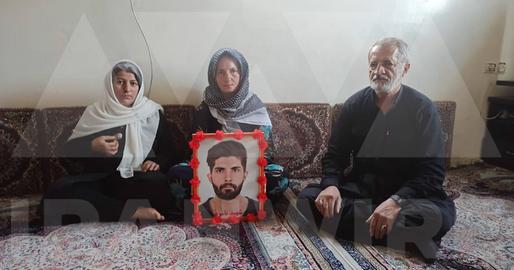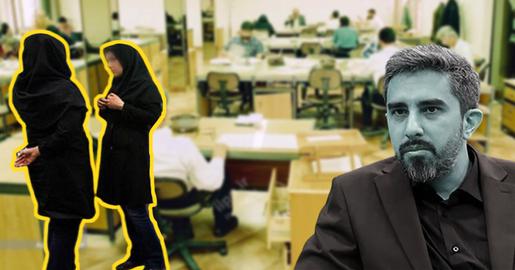Saba and her three-and-a-half year-old son go swimming as part of their daily routine. But suddenly, on July 21, the pool’s managers said they were sorry, but Saba could not get in the pool with her son. “They said they had received a directive ordering them not to let boys into the swimming pool when the pool is reserved for women,” Saba told me. “And when it is the men’s time, little girls are not allowed in, even if they are under five.”
This prompted me to call a few swimming pools around Iran to see whether Saba’s pool is the only place implementing these new rules. “When it is the women’s slot, little girls can swim,” said an employee for one the pools, “and when it is men’s session, the little gentlemen can come along. It can’t be reversed though because the Public Places Police will come down hard on us.” I ask her if they had received a directive to that effect. She paused for a moment and said “No, but they notified us on the phone.”
Another pool in western Tehran confirmed the story. “We had no problem before,” said the person who answered the phone, “but now if the inspectors from the Public Places Police make a surprise visit they can view this as a violation and shut us down.”
An employee of a pool in eastern Tehran gave a short answer before hanging up. “No, ma’am,” he said. “The swimming pool staff would not allow you to get into the pool with a boy.”
Since being informed about the ban, Saba has called a few other pools near her home. All had the same answer. “Some told me, ‘you are welcome here but the boy must come with his father,’” she said. “But my son has no father. We are divorced. Now I will have to wait to send him swimming with one of his uncles.”
One pool employee told Saba just how seriously the police were taking the matter. “Yesterday a daycare center was shut down because they had let boys and girls aged from three to five swim together. So all swimming pools are obeying the order out of fear. It’s the hot season when the swimming pools make their money and we don’t want to be shut down for this nonsense violation.”
Revolutionary Guards Rescue Innocence
The media has reported extensively on the closure of the daycare center. It has been a particularly popular topic with media outlets affiliated with the Revolutionary Guards. First Tasnim News Agency published photographs of boys and girls swimming together in the daycare center’s pool, and voiced its shock that the center had been brazen enough to proudly post the photographs on its website. Tasnim went on to report that other daycares were doing the same.
One day after Tasnim published its report alongside photos of the kids smiling in the swimming pool, authorities issued an order for the establishment to be temporarily closed.
“After Tasnim’s report was published we paid the center a surprise visit,” Ebrahim Ghaffari, the vice president of Tehran’s Welfare Organization, told the news agency. “All the evidence was there and the offending daycare was shut down.”
Tasnim also reported that the National Welfare High Commission had been informed about the temporary closure. The commission has the authority to close the daycare permanently if it wishes, and the Public Places Police can officially oversee the closure. For now, the center has been given a warning, and has been required to make the necessary changes to ensure it falls in line with guidelines for gender segregation in swimming pools.
Not long after these reports were published, the center removed the photographs from its website. Tasnim News, however, refused to remove them from its own website. This led to protests across social networks, especially on Twitter.“If children mixing in the pool is wrong, then so is publishing pictures of them,” one person wrote. Another tweeted: “The same guy who says it’s wrong publishes the pictures himself.” Tasnim was unmoved by complaints and simply blocked critical comments.
Financial and Psychological Costs
But the recent daycare closure is not the only fallout from gender segregation for the under-fives at swimming pools. “Our daycare does not have a swimming pool,” the director of one center told IranWire. “We negotiated with a swimming pool and rented the pool for the kids for three days a week from 9am to 11am. Now the pool is reneging on our agreement and says that we must reserve different times for boys and girls.” Parents had paid for one session, but now the daycare has to pay for two. “From the beginning, swimming lessons were part of the curriculum,” said the director. “The parents insist on it — but paying twice for the pool and the instructor is a money-losing proposition for us.” The center has talked to other swimming pools about possible arrangements, but with no success.
The director of the center, who also holds a degree in child psychology, said the damage will go beyond simple inconvenience or financial hardship. There is a social dimension too.“If children cannot be together at this age, then we are going to have a big problem. They are going to be segregated when they start school, and it’s clear that when they reach puberty they will have problems because they’ll be obsessed about discovering the opposite sex, something that they have always been prevented from.”
The director added that when kids are at primary school, it is an ideal age for girls and boys to mix because they are not yet exploring their sexuality. “Children become aware of their sexual organs for the first time,” she said, “but they still have no sexual desires that would make us worry about letting them mix.”
The recent scandal over gender segregation in swimming pools has not only highlighted the practical implications of enforcing rules, but has also sparked fresh debate about whether these policies promote important social values, or actually create unease and division within society. Like other gender-specific laws in Iran, it's an issue that will continue to receive ample attention in Iran's media, and across social networks.



























comments